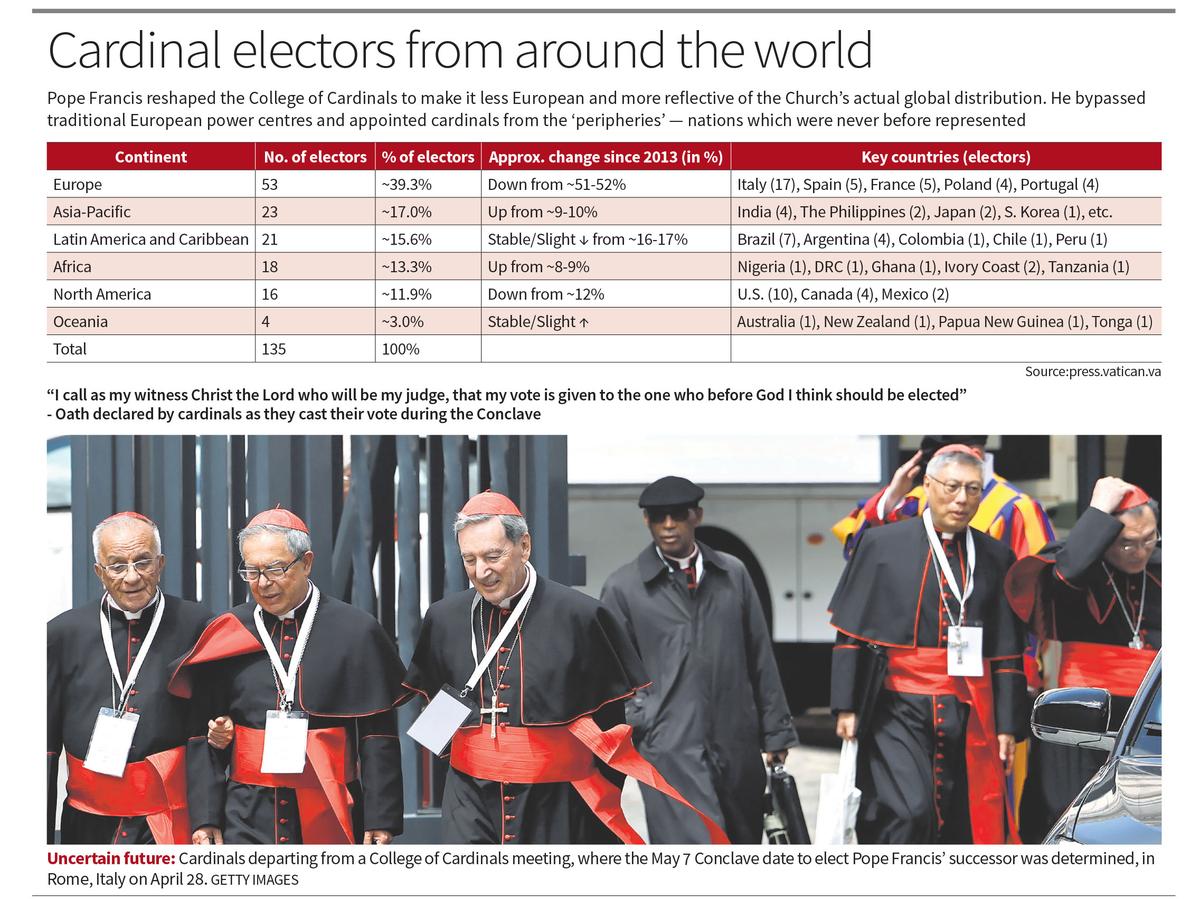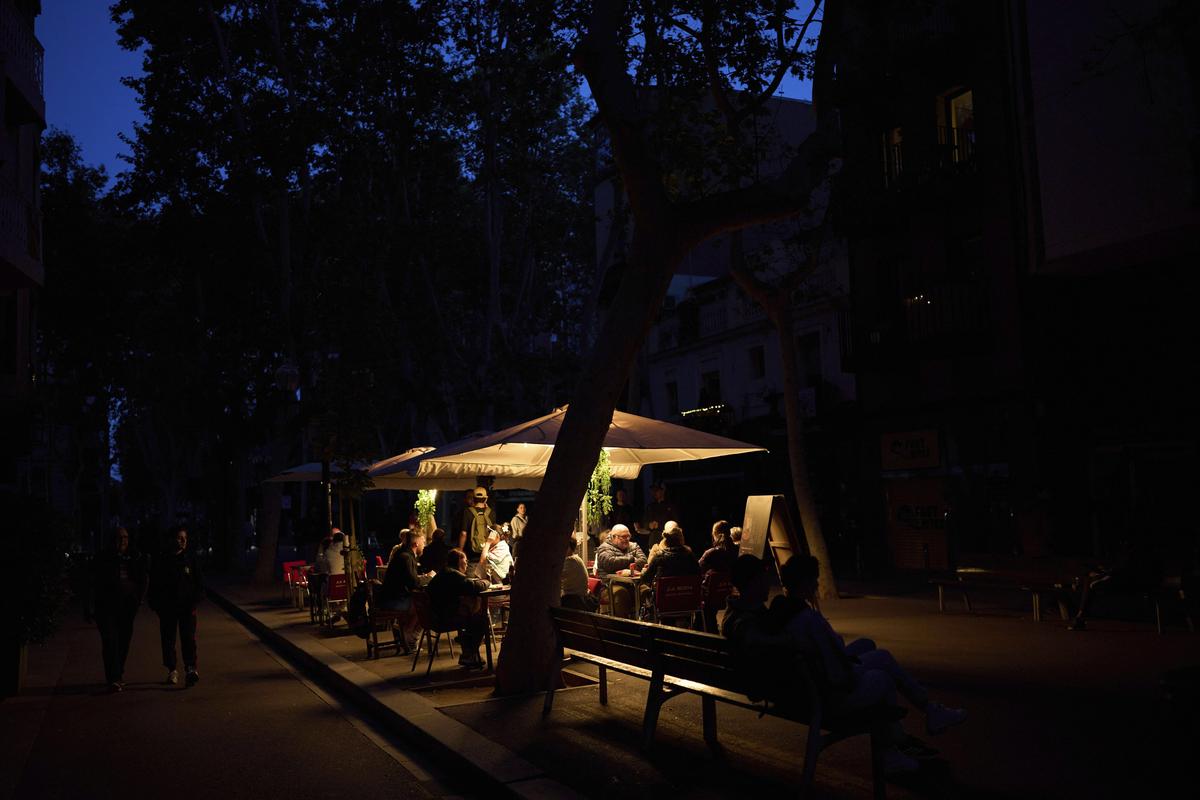The story so far:
Following the death of Pope Francis on April 21, the Catholic Church entered into the sede vacante(the time for which the papal seat is empty). This period culminates in the Papal Conclave, the ancient ritual to elect the next Pope. While deeply spiritual, the Conclave is also a political process — a complex interplay shaped by rules, personalities, historical precedents, and the significant, sometimes controversial, legacy of the previous pontificate.
Also Read: Pope Francis | 1936-2025
How does the Conclave work?
The Universi Dominici Gregis (UDG), an apostolic constitution, governs the process. It dictates strict procedures, and demands secrecy and complete isolation within the Vatican City. This enforced secrecy aims to minimise external influence. However, it simultaneously creates a unique internal political environment. Here, influence hinges on pre-existing relationships, sharp negotiation, and the persuasive efforts of respected figures — the ‘great electors’ — working behind the scenes to build alliances and steer votes. Sequestered, cardinal electors are incentivised to make their choice based on their own conscience, free from external lobbying. Also significant is the fact that a successful candidate requires a a two-thirds majority. This necessitates consensus-building, favours compromise and candidates acceptable across different blocs, preventing any narrow faction from dominating.
Only cardinals under 80 years, at the time of the Pope’s death or resignation, have voting rights. However, cardinals over the age-limit can still participate in pre-Conclave general congregations, leveraging their experience and clout, potentially swaying less experienced cardinals before voting even begins.
The current electorate was significantly shaped by Pope Francis; he appointed approximately 80% (around 108 of the 135 expected attendees) of the voting cardinals. He frequently exceeded the nominal 120-elector limit set by Paul VI — a clear exercise of papal prerogative, allowing a Pope to rapidly influence the body choosing his successor.
What are the major political divisions among electors?
Significant ideological differences mark the College of Cardinals, broadly reflecting the intense debate over Pope Francis’s legacy and the Church’s future path. Broadly there are two major camps — reformist and conservative. The reformist/progressive faction supports Pope Francis’s vision. They emphasise pastoral theology (more practical application) over rigid doctrine, encourage synodality (a more consultative Church), prioritise social justice — poverty, migration, climate change — and favour greater inclusion of women and other marginalised groups such as LGBTQ+ Catholics.
Conversely, the conservative/traditionalist faction has concerns about the perceived doctrinal ambiguity and the departure from tradition during Pope Francis’s pontificate. This faction stresses the need for upholding liturgical tradition (including the restricted pre-Vatican II Latin Mass), clear doctrinal teaching, and seeks a reaffirmation of established moral norms. Some desire a distinct “course correction”.

However, a broad compartmentalisation misses nuance. Such a generalisation is complicated by numerous cardinals, especially appointees from the Global South, who defy easy categorisation. While many of these cardinals hold socially conservative views (evident in the strong resistance by African bishops to Fiducia Supplicans, the document allowing blessings for same-sex couples), they also resonate deeply with Pope Francis’s focus on social justice, poverty, environmentalism, and anti-colonialism. This complex mix makes their voting patterns less predictable. It positions them as a crucial potential ‘swing’ bloc, absolutely necessary for building a two-thirds majority.
How has the geographical balance of power shifted?
Pope Francis deliberately reshaped the College of Cardinals to make it less European and more reflective of the Church’s actual global distribution. He frequently bypassed traditional European power centres and appointed cardinals from the “peripheries” — nations which were never before represented. The result has been profound. Europeans now constitute less than half (approx. 39.3%) of cardinal electors — a first in centuries, dropping significantly from around 51-52% in 2013. While still the largest single regional bloc, with Italy retaining the most electors, Europe’s historical dominance has clearly diminished.

Conversely, other regions have grown: Asia-Pacific accounts for about 17%, Latin America 15.6%, and Africa 13.3%. This globalised composition introduces new political dynamics. Cardinals from the Global South bring perspectives deeply shaped by poverty, migration, interreligious dialogue (especially with Islam), environmental challenges, and the realities of Church growth. Their voices could shift discussions away from solely European concerns. This structural shift increases the plausibility of a non-European Pope and demands cross-regional coalition-building to reach the two-thirds threshold. Latin America, however, remains somewhat underrepresented relative to its large share of the global Catholic population.
What issues will likely dominate the discussions?
The cardinals’ deliberations will inevitably grapple with several pressing issues revealing underlying political and theological tensions. Synodality, perhaps Pope Francis’s defining project, which envisions a Church emphasising listening, dialogue, and shared responsibility, faces a highly contested future. Supporters see it as an essential renewal; critics fear it undermines authority or dilutes doctrine. A candidate’s stance here will be a major indicator.
Navigating contentious social and moral questions also remains a critical challenge. Pope Francis fostered a more pastoral tone regarding LGBTQ+ Catholics, culminating in the controversial Fiducia Supplicans, which faced strong resistance. Balancing pastoral outreach with traditional doctrine is a tightrope the next Pope must walk.
The role of women is another key issue. Despite Pope Francis appointing more women to leadership and allowing them Synod votes, calls for greater inclusion persist, including the unresolved question of women deacons. Sensitive topics like clerical celibacy and bioethics also loom. Further, the global clergy abuse crisis continues its devastating impact on the Church’s credibility. Despite reforms like Vos Estis Lux Mundi (norms established by Pope Francis to tackle sexual abuse), criticisms regarding inconsistent enforcement and accountability linger. Cardinals will likely scrutinise candidates’ commitment to transparency, bishop accountability, and survivor support — a fundamental test of leadership.
Finally, the papacy’s role in geopolitics and internal reform is crucial. The next Pope must navigate conflicts (Ukraine, Gaza), global tensions (U.S.-China), and provide moral leadership on climate change and migration. Diplomatic skill is essential, as is handling sensitive agreements like the controversial Vatican-China deal (allowing the Chinese Communist Party to have a say in bishop appointments, and being criticised for compromising religious freedom). Internally, ensuring the continuation of financial reform in the Vatican, especially after the London property scandal trial, and demonstrating commitment to transparency remain key concerns.
Why is the outcome considered unpredictable?
Vatican observers have highlighted that this Conclave will be of an uncertain nature.
As strict secrecy prevents any external observation of the shifting dynamics and intense alliance-building within the Sistine Chapel, one won’t be able to call the result until the white smoke above the Vatican dispels all doubts. The two-thirds majority rule necessitates broad consensus, often pushing cardinals beyond initial preferences, towards candidates capable of uniting disparate factions. Also, the current college’s diverse composition, with many electors unfamiliar with one another due to Pope Francis’s appointments from the peripheries, adds another layer of unpredictability.
The famous saying, “He who enters the Conclave as Pope, leaves it as a cardinal” suggests that there are no front-runners for Saint Peter’s throne. Ultimately, the choice rests on political manoeuvring, individual discernment, and, for believers, the subtle guidance of the Holy Spirit behind the Conclave’s locked doors.
Franciszek Snarski is interning with The Hindu.
Published – April 29, 2025 08:30 am IST





























